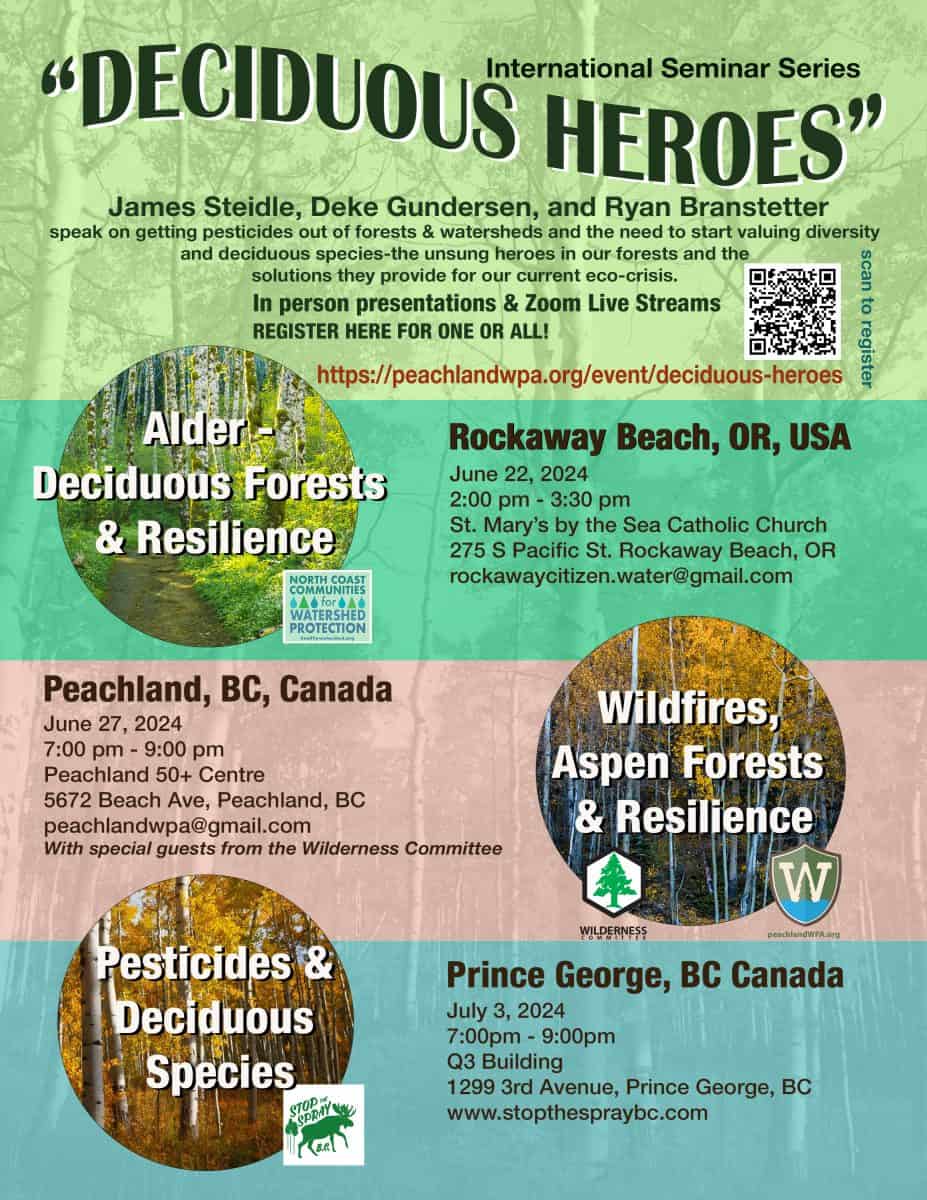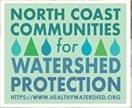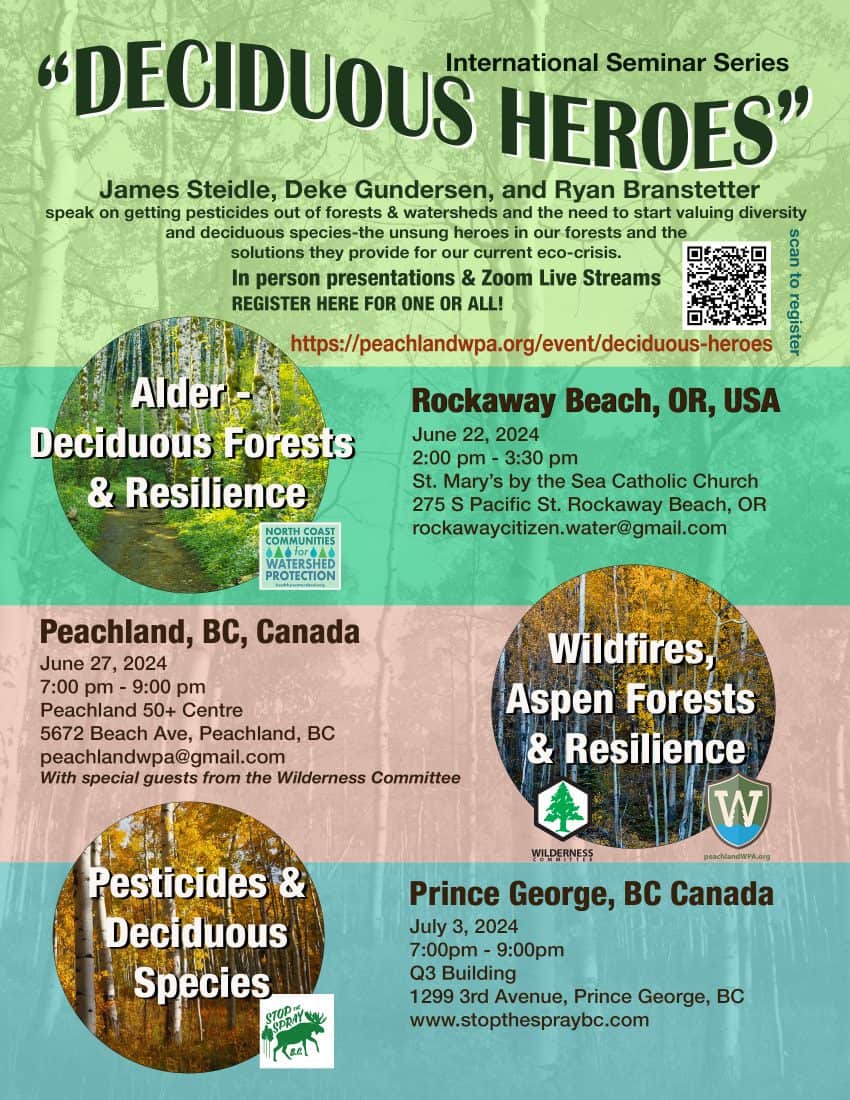North Coast Communities for Watershed Protection (NCCWP) is cosponsoring a Canadian/American speaking tour will be coming to Rockaway Beach, Oregon on June 22 to talk about the need for a new paradigm in forest management.
Taking place at St. Mary by the Sea Parish Hall (275 S Pacific St. Rockaway Beach, OR) from 2:00 to 3:30, the event features Deke Gundersen, Environmental scientist and toxicologist, James Steidle of Stop the Spray BC, and salmon biologist Ryan Branstetter of the Umatilla Tribe. Doors will open at 1:30 pm for mingling and refreshments.
“Forestry in the Pacific Northwest, from Oregon to British Columbia and beyond, has become more like thinking of forests as an agricultural crop, and this has had significant impacts on wildlife, resiliency, and wildfire,” says James Steidle.
Pesticides are widely used in forestry across the Pacific Northwest to remove deciduous species like alder, cottonwood, madrone (arbutus), maple, birch, and aspen. The goal is to grow commercial conifer plantations of one or two species.
“As a salmon biologist, these forests lands, especially those found in the riparian area, are critical to salmon, as the salmon are also critical to the health of the forests, Says Ryan Branstetter. “There are some tough questions to ask as a community, such as: What is a healthy forest? and, How do we maintain a healthy diverse forests?”
Simplifying forests and removing deciduous species like red alder can harm fisheries and increases the probability of forest fires, something recognized as long ago as 1917. It can also undermine the growth of conifer. Experiments with alder in the Columbia Gorge at Wind River in the 1920’s have shown that the Douglas fir that grew under the alder now have 2.1 to 2.8 higher basal area than in the pure douglas fir stands.
“While we begin to recognize the growing benefits of mixed forests and deciduous species in our regional forests, we are also starting to recognize the costs of eliminating them through toxic chemicals,” says Deke Gunderson. “Global pesticide use has skyrocketed and their use in forestry has exploded along with it. Butas pesticide contamination becomes more widespread, we are also starting to recognize their costs.”
Some of the pesticides used in Oregon and Washington State forestry include glyphosate, 2,4-d, hexazinone, and tricoplyr. A recent Oregon study found the presence of these forestry herbicides in 38% of bivalves sampled.
“Healthy, diverse forests, are a good investment for the long term health of our communities along the Pacific Coast. The reason for this is that they are sources for both Indigenous and non-Indigenous peoples foods, medicines, cultural practices, and livelihoods,” adds Bransetter.
Other dates for the tour include Peachland, British Columbia on June 27, and Prince George, British Columbia, July 3. The event is being organized by North Coast Communities for Watershed Protection, Stop the Spray BC, Peachland Watershed Protection Alliance, and Wilderness Committee.
In-person Info and Registration Links:
 Please see the poster below for the venues for the in-person events in each community. Please register using the links below to receive the Zoom link. You can register for one, two, or all three presentations. You can also attend in person. Donations welcomed.
Please see the poster below for the venues for the in-person events in each community. Please register using the links below to receive the Zoom link. You can register for one, two, or all three presentations. You can also attend in person. Donations welcomed.
Oregon: Saturday, June 22, 2024 from 2:00 p.m. – 3:30 p.m.
Register here: https://us02web.zoom.us/webinar/register/WN_dVp0kesuTw65LH1r9vS_Pw#/registration
Peachland, BC: Thursday, June 27, 2024 from 7:00 p.m. – 9:00 p.m.
Register here: https://us02web.zoom.us/webinar/register/WN_nT6DZijlQyarjRhPBnm4aA
Prince George, BC: Wednesday, July 3, 2024 from 7:00 – 9:00 p.m.
Register here: https://us02web.zoom.us/webinar/register/WN_yJiRXxTGThmHEnOgxouy1w#/registration
 NCCWP wants no more logging and pesticide use in community water sources across all land ownership, and wants an end to pesticide applications near where people live, work and recreate.Safe drinking water and clean air are part of the public trust that we all are entitled to have. Please help North Coast Communities for Watershed Protection safeguard and restore our drinking watersheds. healthywatershed.org | www.facebook.com/NCCWATERSHEDPROTECTION
NCCWP wants no more logging and pesticide use in community water sources across all land ownership, and wants an end to pesticide applications near where people live, work and recreate.Safe drinking water and clean air are part of the public trust that we all are entitled to have. Please help North Coast Communities for Watershed Protection safeguard and restore our drinking watersheds. healthywatershed.org | www.facebook.com/NCCWATERSHEDPROTECTION


